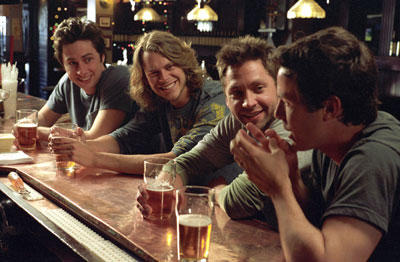Written by Seth Rogen and Evan Goldberg
Directed by Michel Gondry
Starring Seth Rogen, Jay Chou, Cameron Diaz, Tom Wilkinson and Christoph Waltz

Britt Reid: That is the balls.
I’ve got to give it up for Seth Rogen. The man has gone from full on geek to perpetual stoner to slimmed down, unexpected superhero in Michel Gondry’s most indisputable attempt to penetrate the mainstream, THE GREEN HORNET, a big budget 3D adaptation of the popular 1930’s radio series. Rogen’s transformation is admirable but ultimately not as successful as it needed to be to irradicate the image of the affable teddy bear character we’ve all come to know, love and get slightly tired of in recent years. Subsequently, THE GREEN HORNET plays like a laid back stoner flick without the actual weed, and Rogen, without the haze of smoke surrounding him, is just not as funny as he is when he’s high. That said, he could have been high throughout the entire production for all I know. It just isn’t written in this time.

Rogen co-wrote the script to THE GREEN HORNET with SUPERBAD co-writer, Evan Goldberg. Under Gondry’s somewhat scattered direction, their screenplay becomes a surprisingly well-woven send-up of many superhero clichés, while remaining reasonably grounded in a realistic place, with the exception of random misplaced bursts of Gondry’s hyperactive imagination. Rogen plays Britt Reid, the only heir to his father’s (Tom Wilkinson) newspaper fortune. Britt lost his mother when he was just a boy and his relationship with his father has always been strained, living in that vastly cast shadow. His life is one party after another until his father dies suddenly. Unable to resolve the public admiration for a man who never seemed to care about him, Britt decides he is going to save the world his way – in a green mask and hat, one bad guy at a time.

Of course, Britt can’t do this alone so he enlists the help of his super genius buddy, Kato (Jay Chou), to be his alter ego, The Green Hornet’s sidekick. He also takes Cameron Diaz into his fold but she just looks confused as to when her career became about playing such superfluous secondary characters the whole time. Together Britt and Kato form something much stronger than your everyday bromance; each of them now orphaned, they actually become brothers. It is their relationship, uneven and influenced by class and status yet still devoted, that makes THE GREEN HORNET so relatable and real, which is a lot to say about a movie where guys can stop time in their mind. This is the age of the every man superhero after all. The trouble with regular guys though is that they are often nowhere near as funny as they think they are.

















